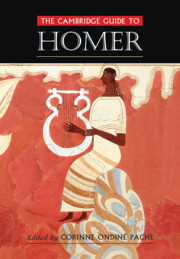Book contents
- The Cambridge Guide to Homer
- The Cambridge Guide to Homer
- Copyright page
- Contents
- Figures
- Notes on the Contributors
- General Introduction
- Part I Homeric Song and Text
- Part II Homeric World
- Introduction
- Homeric Communities
- Homeric Religion
- Homer and History
- Homeric Geography
- Homeric Materiality
- Key Topics
- Afterlife in Homer
- Assemblies and Councils
- Athletic Competition
- Basileus and Anax in Homer and Mycenaean Greek Texts
- Blegen, Carl
- Boars’ Tusk Helmets
- Burial Practices
- Catalogue of Ships: Archaeology
- Catalogue of Ships: Literary Aspects
- Class Relations
- The Literary Tradition of Destruction of Cities
- Divine Epiphany in Homer
- Family and Marriage in Homer
- Feasting and Drinking in Homer
- Archaeology of Hero Cults
- Hittite Literary Evidence
- Homeric Archaeology
- Homeric Economy
- Household Organization
- Lefkandi
- Mycenae
- Nestor’s Cup
- Nostoi
- Offerings in Homer
- Personification in Homer
- Prayers and Vows
- Pylos
- Religious Festivals in Homer
- Schliemann, Heinrich
- Shield of Achilles
- Slavery in Homer and Hesiod
- Supplication in Homer
- Troy and Its Treasures
- Warfare in Homer
- Warrior Graves
- Weapons and Armor
- Women in Homer
- Part III Homer in the World
- Bibliography
- Index
Athletic Competition
from Key Topics
Published online by Cambridge University Press: 22 February 2020
- The Cambridge Guide to Homer
- The Cambridge Guide to Homer
- Copyright page
- Contents
- Figures
- Notes on the Contributors
- General Introduction
- Part I Homeric Song and Text
- Part II Homeric World
- Introduction
- Homeric Communities
- Homeric Religion
- Homer and History
- Homeric Geography
- Homeric Materiality
- Key Topics
- Afterlife in Homer
- Assemblies and Councils
- Athletic Competition
- Basileus and Anax in Homer and Mycenaean Greek Texts
- Blegen, Carl
- Boars’ Tusk Helmets
- Burial Practices
- Catalogue of Ships: Archaeology
- Catalogue of Ships: Literary Aspects
- Class Relations
- The Literary Tradition of Destruction of Cities
- Divine Epiphany in Homer
- Family and Marriage in Homer
- Feasting and Drinking in Homer
- Archaeology of Hero Cults
- Hittite Literary Evidence
- Homeric Archaeology
- Homeric Economy
- Household Organization
- Lefkandi
- Mycenae
- Nestor’s Cup
- Nostoi
- Offerings in Homer
- Personification in Homer
- Prayers and Vows
- Pylos
- Religious Festivals in Homer
- Schliemann, Heinrich
- Shield of Achilles
- Slavery in Homer and Hesiod
- Supplication in Homer
- Troy and Its Treasures
- Warfare in Homer
- Warrior Graves
- Weapons and Armor
- Women in Homer
- Part III Homer in the World
- Bibliography
- Index
Summary
The two Homeric epics make use of different early historical contexts for athletic practice in order to explore broader poetic and ideological themes specific to the poems. Where athletic competition is closely associated with death and the funeral in the Iliad, in the Odyssey we see the potentially violent aspects of athletic contest used in the contexts of entertainment, marriage, and the renewal of life.
- Type
- Chapter
- Information
- The Cambridge Guide to Homer , pp. 296 - 299Publisher: Cambridge University PressPrint publication year: 2020

